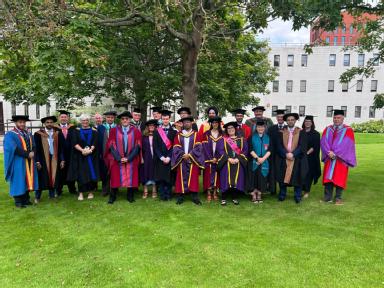WMG News
Project workshop addresses cyber-security in connected and autonomous mobility
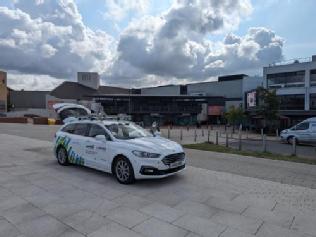 Researchers from WMG, at the University of Warwick, were pleased to welcome partners and guests to a live trial and project workshop on the AirQKD project.
Researchers from WMG, at the University of Warwick, were pleased to welcome partners and guests to a live trial and project workshop on the AirQKD project.
AirQKD addresses the cyber security of Connected and Autonomous Vehicles (CAV) and specifically addresses components, manufacturing, software, and testing for last-mile Quantum Key Distribution (QKD) systems between shared parties for 5G and connected cars.
It is an Innovate UK funded collaboration between BT; Lexden Technologies; OLC; Duality, Bristol University; Fraunhofer Centre for Applied Photonics; Strathclyde University; WMG; Bay Photonics; Heriot Watt University; Angoka; ArQit; Nu Quantum; National Physical Laboratory; CSA Catapult and Edinburgh University.
The trial combines BT’s expertise in building quantum-secure networks using QKD – an essentially un-hackable, cutting-edge technique for sharing encryption ‘keys’ between locations using a stream of single photons) with other new techniques for applying quantum security to mobile devices, developed by UK start-ups Nu Quantum, Angoka and Duality.
On the University of Warwick campus, as part of the Midlands Future Mobility testbed, WMG has created a Vehicle to Infrastructure (V2I) testing facility enabling AirQKD partners’ technology in key management, key consumption, and security protocols to be used for secure communications.
The AirQKD system implements Free Space Optics (FSO) cryptographic key generation and standards-compliant key management. WMG is now managing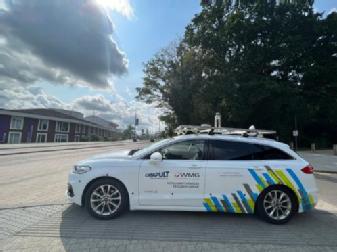 the workstream between telecommunications (4G/5G cellular at BT’s Adastral Park site) and V2I communications on the University of Warwick campus. In combination, these technologies will be used to deliver an ultra-secure link between connected 5G towers and mobile devices, as well as to connected cars.
the workstream between telecommunications (4G/5G cellular at BT’s Adastral Park site) and V2I communications on the University of Warwick campus. In combination, these technologies will be used to deliver an ultra-secure link between connected 5G towers and mobile devices, as well as to connected cars.
Find out more about CAV research at WMG here: https://warwick.ac.uk/fac/sci/wmg/research/cav/connectivity/
Read more about AirQKD here: https://warwick.ac.uk/fac/sci/wmg/research/transformation/securecybersystems/projects
Congratulations to the WMG Class of 2023
On Thursday 27th July, WMG celebrated the success of its latest graduates.
With a total of 562 Master’s, Undergraduate, Postgraduate and Research students graduating, the team at WMG is very proud of everything the Class of 2023 has achieved.
There were 150 Undergraduate students, 76 of whom completed a Degree Apprenticeship, 73 studied full-time with one studying part-time.
For Postgraduate there were 383 Master’s students; 267 were full-time students, 31 part-time, and 85 studied overseas.
There was a further two MSCRs (Masters by Research), 22 PhD, and five EngD students.
Professor Gill Cooke, Director of Education, at WMG, University of Warwick said: “We are incredibly proud of our graduates. They have worked incredibly hard, and we hope they enjoy celebrating their achievements. We wish them all the best for the next stage of their careers.”
To find out more about studying at WMG visit https://warwick.ac.uk/fac/sci/wmg/education/
Warwick student wins logistics research award for supply chain dissertation
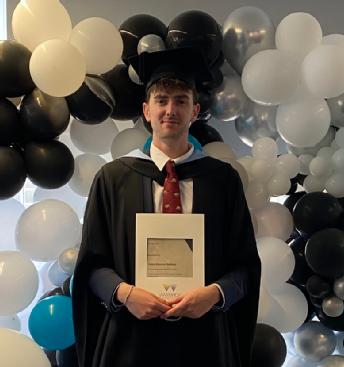 Pablo Brereton Rodrigo, a School of Engineering student at the University of Warwick, has won the Logistics Research Network Undergraduate Dissertation of the Year Award 2023, from the Chartered Institute of Logistics and Transport (CILT).
Pablo Brereton Rodrigo, a School of Engineering student at the University of Warwick, has won the Logistics Research Network Undergraduate Dissertation of the Year Award 2023, from the Chartered Institute of Logistics and Transport (CILT).
Pablo has recently completed his degree in Engineering Business Management. This undergraduate degree, although part of the School of Engineering, is led by the education team at WMG, University of Warwick.
Pablo’s dissertation entitled “Integrating supply chains in a turbulent, complex and uncertain era” was nominated by Professor Rob Thornton, Director of Undergraduate Programmes, at WMG. Pablo will be presented with his certificate and prize money at the Logistics Research Network Conference (LRN 2023) dinner and awards ceremony on the 7th September 2023 at Herriot-Watt University.
Professor Thornton explained: “Pablo’s dissertation was nominated for this award, for both academic excellence and the challenging topics addressed, which are highly relevant to today’s turbulent supply chains.”
Pablo said: “In discussing topics such as supply chain integration, I explored the challenging and turbulent landscape in today’s business environment and applied it to modern-day supply chains to reach the conclusion that forward-looking firms will leverage supply chain integration through self-contained, cross-functional and digitalised many-to-many structures.
“Directly applying skills learned during my placement year in supply chains, this project has further developed my personal growth and competencies relevant to the field. As such, I am immensely grateful to my university tutor, Alexa Kirkaldy, and all my friends and family for the continued support throughout the project.”
Pablo’s research was supervised by Alexa Kirkaldy, Associate Professor and Director of Academic Integrity at WMG who said: “Pablo defined his project idea and objectives after a year in industry and was excited to delve into the topic of supply chain integration, reaching depth and breadth usually expected at Master’s level. In addition Pablo was a delight to supervise and I wish him well in his career within the semiconductor industry.”
Professor Georgia Kremmyda, Head of Teaching and Deputy Head of School of Engineering said: “On behalf of the School of Engineering and the Education team, I would like to warmly congratulate you for your amazing achievement. The award strongly highlights your effort, commitment and dedication to your studies. You should take time to celebrate what you have accomplished.”
Professor David Towers, Head of School at the School of Engineering added: “This is quite an achievement and definitely something to capture on your CV!”
To find out more please visit: WMG - The University of Warwick
Widening participation work experience week connects under-represented aspiring engineers with industry giants
The University of Warwick's commitment to widening participation and fostering inclusivity took centre stage during a week-long programme aimed at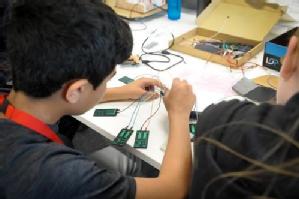 inspiring 30 students from local schools to pursue careers in engineering. The initiative was organised by WMG at the University of Warwick and the University's Widening Participation Team which wanted to support under-represented students that might lack confidence or support when they consider a future in engineering.
inspiring 30 students from local schools to pursue careers in engineering. The initiative was organised by WMG at the University of Warwick and the University's Widening Participation Team which wanted to support under-represented students that might lack confidence or support when they consider a future in engineering.
Throughout the programme, participants gained valuable insights into various engineering pathways and learnt more about research and careers at WMG alongside partners like Tata Motors. WMG research and teaching staff mentored the students, providing them with a taste of what studying engineering involves through an engineering project.
Laboratory and workshop tours, facilitated by WMG apprentices and Tata Motors, gave participants firsthand exposure to the dynamic environment of an engineering workplace. The event culminated in a showcase where the students presented their projects, highlighting both their engineering skills and the knowledge they gained during the week.
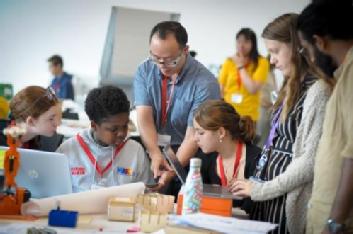 The project was also supported by student ambassadors from across the University; Drishti, David, Ana, Brij, Sheerah, Diya, Michelle, Gabe and Chinmay, giving the young visitors to our campus an experience of what studying in Higher Education is like. The Widening Participation team also gave a session providing information, advice and guidance on how they might enter university study. Throughout the week, young people therefore had experiences and interactions all the way from undergraduate level through the University hierarchy to the Dean of WMG.
The project was also supported by student ambassadors from across the University; Drishti, David, Ana, Brij, Sheerah, Diya, Michelle, Gabe and Chinmay, giving the young visitors to our campus an experience of what studying in Higher Education is like. The Widening Participation team also gave a session providing information, advice and guidance on how they might enter university study. Throughout the week, young people therefore had experiences and interactions all the way from undergraduate level through the University hierarchy to the Dean of WMG.
One participating student said: "Visiting the National Automotive Innovation Centre with Tata Motors has opened my eyes to what engineering is really like, and I would like to learn more about degree apprenticeships with the University of Warwick.”
Another said: "I would describe this programme to a friend as an unmissable and eventful opportunity which I would heavily recommend as it has boosted my skills and given me a greater insight into careers, apprenticeships and university as a whole which has inspired me to want to go to university.”
Professor Robin Clark, Dean of WMG said: “There is a clear pathway from this point to being professional engineers. There may be many routes – whether through an apprenticeship or through a taught degree programme – but the skills and experience needed for all those routes are the same: perseverance, determination, initiative, and curiosity. Having a product on display at this showcase also demonstrates plainly those qualities in the people who have made them.”
Dr Phil Jemmett, Widening Participation Coordinator at WMG said: "This work experience model has been in our minds since 2019 and this is the first time we've been able to run it at full scale. Students have been working with our engineers on group projects all week and have gone on a journey through engineering and rapidly prototyping equipment.
“Each challenge links to WMG research and to challenges in the real world that could help make our planet's future more sustainable. With the skills we have seen in these students this week I have no doubt that our STEM industry is in safe hands in the future. They have been amazing."
The University of Warwick's initiative reflects its dedication to providing equal opportunities in engineering education. By empowering less privileged local students and challenging misconceptions about the field, they are nurturing a diverse talent pool that will shape the future of engineering.
Find out more about WMG's Outreach programme here
Ends
Notes to editors
For media inquiries and interview requests, please contact:
Bron Mills, Bron.mills@warwick.ac.uk, +447824 540 720
Professor David Greenwood on UK Gigafactory announcement from TATA Sons/JLR
Reactive statement from Professor David Greenwood, CEO of the High Value Manufacturing Catapult and Director of Industrial Engagement at WMG at the University of Warwick
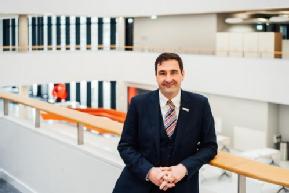 “This is fantastic news and secures the future of our UK auto industry which would otherwise have been lost by 2035. Furthermore, this secures the supply chain meaning we’ve kept those jobs for everyone across the country.
“This is fantastic news and secures the future of our UK auto industry which would otherwise have been lost by 2035. Furthermore, this secures the supply chain meaning we’ve kept those jobs for everyone across the country.
“This announcement means that the UK is now above “critical mass” for supply chain companies and therefore sets the UK up to be an attractive place for businesses in the supply chain to invest to supply upstream and downstream materials needed for electric vehicle production. As one of the UK’s biggest academic institutions working in the area of battery and electric vehicle innovation, this is great news for all 250 of our researchers – we will now see the results of our work used in UK based industries and benefiting UK taxpayers rather than being exploited by competitors abroad.
“This is the culmination six years work here at Warwick Manufacturing Group - we helped the UK government set up the Faraday Battery Challenge which was a key part of the then Government’s industrial strategy. That investment has now borne fruit. Clearly, we now need to define our future vision and strategy as the global industrial landscape evolves at breakneck speed.
“This means the Prime Minister has realised he must provide sufficient investment to ensure the country is a competitive runner in the global race to dominate the markets created by the massive green transition needed to avert climate catastrophe.”
Battery recycling
Researchers at the University of Warwick estimate that by 2040 339,000 tonnes of batteries are expected to reach the end of their life in the UK alone.
Prof David Greenwood adds: “While we are busy building all these electric cars, we also need to think about what happens at the end of their useful life. Batteries contain significant quantities of materials which are costly to extract and refine and which could be hazardous to the environment if improperly disposed of. Investment is needed to create suitable recycling facilities in the UK within the next few years, and beyond that further research is needed to allow economic recovery of much greater proportions of the battery material. In doing so we will protect the environment, secure valuable raw materials, and reduce the cost of transport.”
Gigafactory FAQs
What is a gigafactory?
A gigafactory is a large factory that produces large numbers of batteries for electric vehicles. Tesla has pioneered the concept in the US, with six factories so far to produce batteries for their cars.
Why do we need one?
In order to a compete internationally and help preserve the UK automotive industry battery production needs to be scaled up rapidly across both the UK and Europe. This situation is exacerbated by tariffs due to be imposed across the UK and EU unless a certain proportion of a car is produced in one of those jurisdictions.
As an EV battery makes up around half of a vehicle’s weight it is crucial the UK vastly scales up battery production. Gigafactories are the most efficient way to do this.
How are electric car batteries made?
EV batteries come in lots of different shapes and sizes but are all made up of many battery cells put together to form a battery pack.
To make a battery, we take electrochemically active materials, like graphite, nickel manganese, cobalt and lithium, and make powders from them. These powders are mixed with solvents and adhesives, then coated onto metal (aluminium or copper) foils which are then packaged together inside cells.
This is a very precise process – otherwise the quality of the battery is impacted. At WMG, around 20 battery cells per day can be produced. At a gigafactory, production would be closer to 20 cells per second.
How are batteries recycled?
To recycle batteries, fire is used to recover most of the metals. Water can then be used to get further metals that can’t be reached using heat alone. There are still difficulties however in recycling lithium or graphite, which make up a large percentage of the metals in the batteries themselves.
With 11 million tonnes of lithium-ion batteries expected to need recycling by 2030, the need to build domestic capacity to recycle them is greater than ever.
WMG helps bridge engineering skills gap with Design and Make Challenge
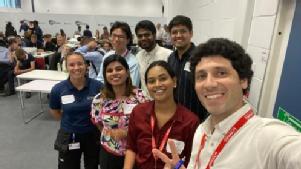 Members from WMG at the University of Warwick’s SME team worked together with the Manufacturing Assembly Network (MAN Group), on Tuesday (11th July), to offer a group of students the opportunity to learn real life engineering and design skills.
Members from WMG at the University of Warwick’s SME team worked together with the Manufacturing Assembly Network (MAN Group), on Tuesday (11th July), to offer a group of students the opportunity to learn real life engineering and design skills.
Eighty pupils from 16 local schools swapped their daily lessons to take part in the challenge. They were tasked,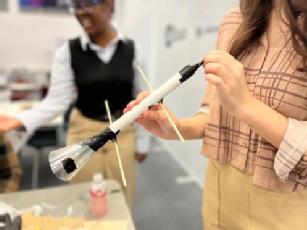 supported by engineers from the MAN Group's eight member companies, with building a miniature aircraft and then testing the designs.
supported by engineers from the MAN Group's eight member companies, with building a miniature aircraft and then testing the designs.
The event took place on the University of Warwick campus and was attended by WMG’s Executive Chair, Margot James, as well as representatives from the BBC and Sky News.
Dr Mark Swift, Director of SME Engagement at WMG, University of Warwick: "WMG is working tirelessly to address the skills gap, that our SME manufacturing partners continue to face, through education programmes; innovation projects; internships and knowledge transfer partnerships.
“It’s important that the manufacturing industry engages with future engineers, to encourage, inspire and lead us into a prosperous future together. This is exactly what the Design and Make Challenge aims to do.
“This event in particular, really brings home the creativity and innovation involved in the manufacturing sector, and it was a privilege to be part of it.”
You can watch footage of the event here: http://www.capturepr.co.uk/design_and_make_challenge_110723.html
£1.5m funding secured to advance the investigation of microstructures in battery materials
Researchers at WMG, University of Warwick’s Forensics & Advanced Characterisation of Batteries Group, have secured £1.5m funding for materials analysis in multiple format batteries.
The funding, from the University of Warwick’s Academic Equipment Fund and the High Value Manufacturing Catapult, will be used to purchase a Plasma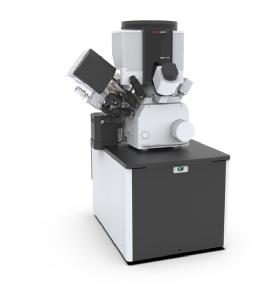 Focused Ion Beam (PFIB) microscope. The microscope is key to the accelerated development of new battery chemistries, providing unique access to the critical interfaces within battery cells that dictate best performance. This will be instrumental in developing new materials for better batteries, regardless of their end use application.
Focused Ion Beam (PFIB) microscope. The microscope is key to the accelerated development of new battery chemistries, providing unique access to the critical interfaces within battery cells that dictate best performance. This will be instrumental in developing new materials for better batteries, regardless of their end use application.
This PFIB will be the first specifically configured microscope dedicated to battery research in the world, allowing researchers at WMG to inform battery manufacturing, answer key scientific questions and link with industry and growing supply chains.
There is increased recognition in the battery community that the integration of new chemistries needed for the UK Government’s 2030 electric vehicle battery targets will require integrating new manufacturing processes with advanced microscopic characterisation. The PFIB has been specifically designed to address the critical challenges of studying alkali-based battery systems and will provide unique insights needed for the development of next generation batteries.
 The performance of battery materials is dictated by the stability, efficiency and functionality of the interfaces, i.e. the solid electrolyte interphase (SEI) at the anode and oxygen-induced cathode-electrolyte interface (CEI) at the cathode. Attempts to analyse these interfaces, in order to determine structure and chemistry, is seriously compromised using conventional techniques by the extreme air-sensitivity, beam sensitivity and the high volatility of certain species present. The specially configured PFIB microscope will address these issues.
The performance of battery materials is dictated by the stability, efficiency and functionality of the interfaces, i.e. the solid electrolyte interphase (SEI) at the anode and oxygen-induced cathode-electrolyte interface (CEI) at the cathode. Attempts to analyse these interfaces, in order to determine structure and chemistry, is seriously compromised using conventional techniques by the extreme air-sensitivity, beam sensitivity and the high volatility of certain species present. The specially configured PFIB microscope will address these issues.
WMG is one of seven HVM Catapult centres in the UK and is the lead centre for transport electrification. Investment in this PFIB is part of a range of equipment investments by the HVM Catapult and the University of Warwick to maintain WMG’s leading position in battery technology.
The PFIB has already secured interest from the Faraday Institution and from the Royal Academy of Engineering’s Lord Bhattacharyya Education Programme. Starting in the Autumn, a student will use this for a project entitled “The development of a new multi-modal capability for investigating the performance-controlling interfaces and microstructures that underpin operation of battery materials.”
The Lord Bhattacharyya Education Programme provides up to 90 bursaries annually for local students from lower socio-economic backgrounds. The objectives for the scheme include encouraging a greater number of young people from a more diverse range of backgrounds, raising their aspirations and skill levels. Moreover, it supports the growth of a science and engineering skills base for the UK.
The project will make extensive use of the new system to develop strategies for studying the degradation of buried interfaces and structure dynamics in state-of-the-art high Ni NMC cathodes as a function of cycle ageing i.e., the evolution of the cathode-electrolyte interphases. The platform provides some unique opportunities for developing powerful new ways to characterise these controlling interfaces and will form the basis for the project. Preliminary research will commence in October 2023. The project will be advertised online for interested applicants to apply – the studentships page, Jobs.ac.uk, FindAPhD.com and the Doctoral College website.
Find out more about WMG’s electrochemical research here: Electrochemical Materials (warwick.ac.uk)
The new PFIB microscope will be based in WMG’s Advanced Material Manufacturing Centre (AMMC).
Warwick University's Formula Student Team Unveils Cutting-Edge Race Car for 2023 Season
The University of Warwick student team at Warwick Racing (WR), has unveiled its 2023 racing cars that will compete in the Formula Student competition at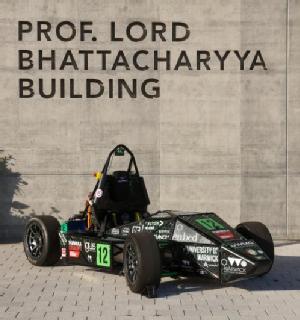 Silverstone just two weeks after the British Grand Prix.
Silverstone just two weeks after the British Grand Prix.
The cars will be judged on speed, acceleration and endurance at the Formula Student competition – the largest student motorsport competition in the world.
With a legacy of engineering excellence and a passion for motorsport innovation, Warwick Racing is a team made up of over 100 talented and dedicated students from diverse backgrounds and disciplines, who work collaboratively to design, build, and race high-performance vehicles that compete against university teams from around the world.
This year, the team have built their first electric autonomous race car, Wrai and the WRe2 – a battery electric race car. The cars were unveiled on 29th June 2023, at the National Automotive Innovation Centre.
The cars include use of cutting-edge technology, such as torque vectoring which enhances performance, while the autonomous car applies advanced software and artificial intelligence (ai) to an electric racing car to enable driverless racing.
The Formula Student competition, run by the Institute of Mechanical Engineering, serves as a launchpad for the next generation of engineers and allows participants to showcase their technical expertise, creativity, and teamwork. Warwick University's team, known for their commitment to excellence, has achieved some remarkable results in previous years including second place for business performance in 2022, and winning ‘most reliable EV’ in 2021. This year Warwick Racing are entering all three classes at the competition: Formula Student, AI, and Concept.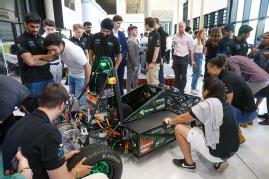 Team Principle and MEng Mechanical Engineering student, Prem Singh Gill said "We are incredibly proud to present the WRe2 and WRai to the world. Our team has poured their hearts and souls into this project, and we are confident that our cars will make a strong impact in the upcoming Formula Student competition at Silverstone. We invite everyone to join us in celebrating the culmination of our hard work and dedication. We are incredibly grateful to the University, WMG, High-Value Manufacturing Catapult, and our main sponsor Optimas."
Team Principle and MEng Mechanical Engineering student, Prem Singh Gill said "We are incredibly proud to present the WRe2 and WRai to the world. Our team has poured their hearts and souls into this project, and we are confident that our cars will make a strong impact in the upcoming Formula Student competition at Silverstone. We invite everyone to join us in celebrating the culmination of our hard work and dedication. We are incredibly grateful to the University, WMG, High-Value Manufacturing Catapult, and our main sponsor Optimas."
Student Projects Manager Dr James Meredith said: “The cars look fantastic, they represent a culmination of a huge effort from students and staff at WMG, University of Warwick and we are really proud to see them launched. We very much look forward to seeing them compete at Silverstone.”
Ends
Notes to editors
For media inquiries and interview requests, please contact:
Bron Mills, Bron.mills@warwick.ac.uk, +447824540720
About Warwick University Formula Student Team:
The Warwick University Formula Student team is an interdisciplinary group of students passionate about automotive engineering and motorsports. With a legacy of success and innovation, the team aims to design, build, and race high-performance vehicles that compete in the Formula Student competition. The team represents Warwick University on a global stage, showcasing their technical expertise and pushing the boundaries of automotive engineering.
WMG welcomes Indian Forum of Parliamentarians
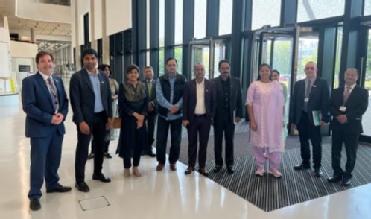 On Friday (16th June) Professor Robin Clark, Dean of WMG; and Professor David Greenwood, CEO of the High Value Manufacturing Catapult and Director of Industrial Engagement at WMG, were pleased to welcome guests from the Indian Forum of Parliamentarians.
On Friday (16th June) Professor Robin Clark, Dean of WMG; and Professor David Greenwood, CEO of the High Value Manufacturing Catapult and Director of Industrial Engagement at WMG, were pleased to welcome guests from the Indian Forum of Parliamentarians.
The delegation was made up of representatives from across various political parties including Shri Rajiv Pratap Rudy, Chair of the Forum of Parliamentarians; Ms. Vandana Chavan - National Congress Party; Shri Krishna Devarayalu Lavu - Yuvajana Sramika Rythu Congress Party; Shri Sujeet Kumar - Biju Janata Dal; Shri N K Premachandran - Revolutionary Socialist Party; and Shri Brijendra Singh - Bharatiya Janata Party.
The guests were particularly keen to hear more about WMG’s research and education programmes in electrification and mobility.
They were given a tour of the real-world demo site of the track system for the Coventry Very Light Rail flagship transport project, before Professor David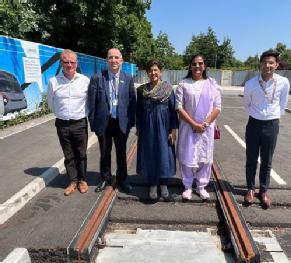 Greenwood led a tour of the Energy Innovation Centre (EIC) the home of WMG’s battery research.
Greenwood led a tour of the Energy Innovation Centre (EIC) the home of WMG’s battery research.
Finally the group heard more about the Warwick Moto project, where engineering students have been tasked with designing, building and racing an electric superbike.
The parliamentarians also had the opportunity to meet with Indian PhD students and researchers, studying and working at WMG.
Professor Robin Clark, Dean of WMG, explained: “ It was a pleasure to welcome the group of Indian Parliamentarians. Our relationship with India is long standing, and one that we value very highly.
“One example of our commitment is the strength of our relationship with IIT (Indian Institute of Technology) Kharagpur, whom in October 2022 we signed a Memorandum of Understanding (MoU) for a further five years, having first started in 2006.
We are increasingly appreciating the breadth of opportunity India presents, both in the academic and industrial spaces. As India is our main focus internationally at present, we expect to see more visits and more projects over the coming months and years!”
WMG welcomes Richard Parker
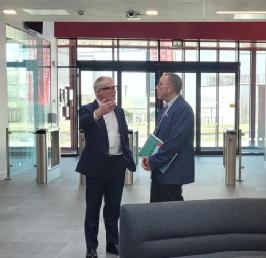 Professor Robin Clark, Dean of WMG welcomed Richard Parker, the Labour Party candidate for the Mayor of the West Midlands, to see WMG’s work on skills and innovation and to meet students, technicians and researchers who are working with West Midlands businesses to support industrial innovation and sustainability.
Professor Robin Clark, Dean of WMG welcomed Richard Parker, the Labour Party candidate for the Mayor of the West Midlands, to see WMG’s work on skills and innovation and to meet students, technicians and researchers who are working with West Midlands businesses to support industrial innovation and sustainability.
Following his selection for the West Midlands Mayoralty, Richard Parker is looking to develop his understanding of the West Midlands’ industrial innovation field to shape his manifesto.
Professor Robin Clark took him on a tour of WMG’s research and education facilities including the Degree Apprenticeship Centre where he had the opportunity to meet and chat to WMG apprentices and hear more about the WMG Skills Centre.
Following this, he went on to visit the real-world demo site of the track system for the Coventry Very Light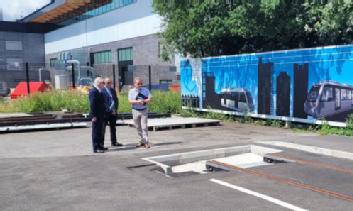 Rail flagship transport project, before receiving a tour of the Energy Innovation Centre (EIC) to hear more about WMG’s transport electrification projects with companies including Tata, Norton and Lotus.
Rail flagship transport project, before receiving a tour of the Energy Innovation Centre (EIC) to hear more about WMG’s transport electrification projects with companies including Tata, Norton and Lotus.
Professor Robin Clark, Dean of WMG, said: “It was a pleasure to welcome Richard Parker to WMG.
“We were pleased to have the opportunity to demonstrate our commitment to developing new engineering and manufacturing skills to help bridge the gap between academia and industry; and the chance to showcase our projects supporting productivity and sustainability in the region.”

